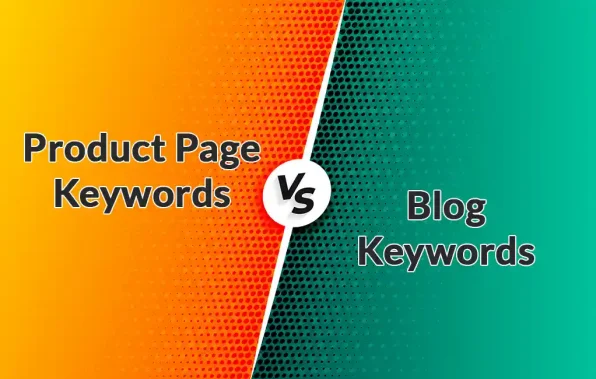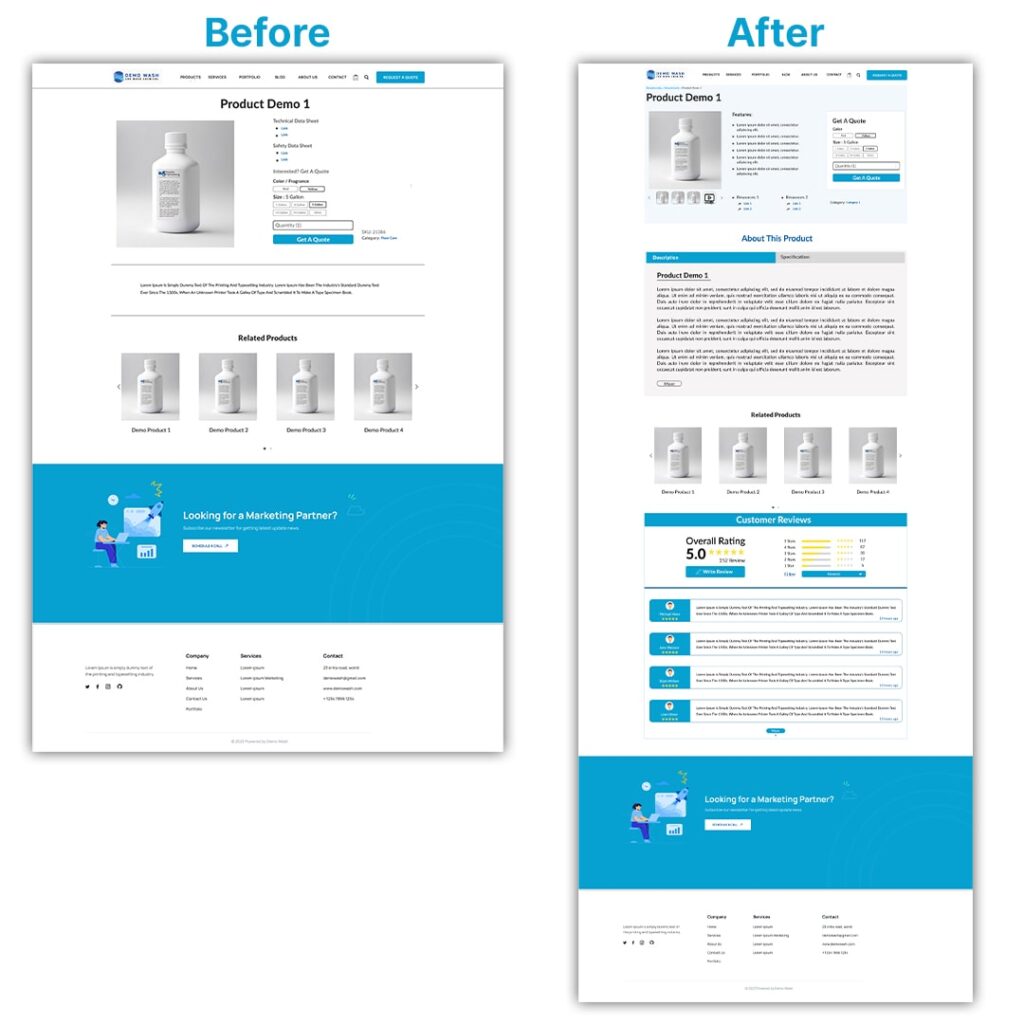Standing out from the competition is often considered the ultimate key to success. But do you know the secret behind it?
Is it having a great product or a stunning website? Or maybe both?
Well, your guess is right to a certain extent. But, apart from these things, you have to understand the very language that your potential customers use. So they can easily find you and take service from your business.
This is where the ecommerce keyword research comes into the roleplay!
From improving your online presence to driving organic traffic and boosting the sales rate – the list goes on. That’s why understanding the essentials of eCommerce keyword research is like the cornerstone of building a thriving online business.
Want to know more in detail? Keep Reading, my friend!
Understanding Ecommerce Keyword Research
Ecommerce keyword research is basically the process of finding and selecting specific words or phrases that people commonly use when searching for products online. These keywords, in return, help the online stores improve their visibility in search engine results and attract potential customers.
Let’s say, for example, you run an online shoe store. You decide to do keyword research and find that “running shoes for women” is a highly searched keyword.
You would then strategically incorporate this keyword into your product listings and website content, making it easier for shoppers to discover your store when they search for women’s running shoes online. Ultimately leading to an increased traffic and sales rate!

Key Factors in Ecommerce Keyword Research
Ecommerce keyword research is a significant aspect of search engine optimization (SEO) and online marketing. To succeed in ecommerce, you need to identify and target the right keywords that will definitely drive traffic and result in conversions.
Some of the key factors to consider in ecommerce keyword research are as follows:
1. Search Intent
Search intent they are like those magical directions that guide you through the vast sea of online shoppers. That is, it is not about just what people type into the search bar but it is about why they type it.
Like, are they looking for information, ready to make a purchase, or maybe seeking product reviews? You must decipher this intent to tailor your content and product offerings.
For example, if someone is looking for the “running shoes for summer,” then they are probably in the research stage. But if they type “buy Nike Air Zoom Alphafly,” then they are most likely to whip out their credit card.
Therefore, understanding the core of search intent helps you cast the right bait in the online ocean. In other words, being a mind reader for your targeted audience!

2. Search Volume
Next up, we have the search volume. They basically tell you how often a particular keyword or phrase is searched for in the search engines.
For instance, high search volume keywords can be pretty tempting, much like riding a massive wave, but, of course, the competition is pretty fierce. On the flip side, the low search volume keywords might seem like a placid pond, but, in reality, they are like hidden gems, even if they are considered less competitive.
So, balancing between the high and low search volume keywords is the ultimate key. To be more precise, high-volume keywords can bring in more organic traffic, attracting a lot of potential customers, but here, the competition is high-pitched.
While the low-volume keywords may have less traffic, if they are super relevant to your niche, then they can certainly bring in potential customers who are more likely to convert. Much like a bit of high wire act, but with the right mix, you can definitely build a robust bridge to success in the e-commerce world.
3. Keyword Difficulty
Suppose you are on a quest to conquer the vast kingdom of e-commerce. So, what will you be needing?
A map to navigate through the treacherous terrain of keywords, right?
Well, that map, my friend, is known as the “Keyword Difficulty.” In other words, they are like the legend of the map, telling you how difficult it will be to rank for a particular keyword.
That is, high competition keywords are like those heavily fortified castles, extremely difficult to conquer, but the rewards are certainly pleasing. While the low competition keywords are like those hidden treasures in the forest, which are pretty easy to nab, the loot is quite smaller.
4. Long-tail Keywords
Long-tail keywords are like the magical spells that open the secret doors in your eCommerce store. They are longer but, at the same time are more specific phrases that people mostly use when searching for products.
Simply put, they are like the map coordinates that guide customers straight to what they want. For instance, instead of just “running shoes,” you may target “best lightweight running shoes for marathon training.”
These phrases might have a low search volume, but they can certainly bring you highly motivated customers. Such as, if someone searches for “best lightweight running shoes for marathon training,” then obviously that person is a marathon enthusiast who is all ready to buy.
Though these keywords might not increase your chances of high running, they definitely play a big role in increasing your conversion rate. So, even by mistake, don’t overlook the power of these long-tail keywords.

5. Product Page Keywords Vs. Blog Keywords
Here, we are with the ultimate showdown between the Product Page and Blog Keywords. Much like a battle in the Wild West, but with words instead of guns!
Product Page Keywords
They are like your sharpshooters, the mainstay. Simply state, whenever you are selling any products online, having the right keywords on the product pages is like having a storefront with neon lights. That is, these keywords are specific, laser-focused, and all about converting visitors into buyers.
For example, if you are selling red, vegan leather cowboy boots, then it is better if your product page has keywords like “red vegan leather cowboy boots” front and center.
Similarly, if you are selling handcrafted leather bags, then keywords like “luxury leather handbags” or “handmade leather totes” are preferable.
Why? Because they are too specific and, of course, directly related to the products you are selling. Here, the ultimate goal is to get all the wares noticed by the potential customers who are ready to make a purchase.

Blog Keywords
Moving on to the blog keywords, they are those lively conversations that happen to connect with your targeted audience, share your expertise, and establish yourself as an authority in your niche. You can compare them much like the magnets.
After all, from drawing in the potential customers by addressing their questions, problems, and interests, they simply work wonders.
For instance, if you have a business selling exquisite leather bags, then your blog must feature keywords like “how to care for leather bags” or “top fashion trends for leather accessories.” These keywords, in return, will help you to attract people interested in your niche, create trust, and eventually lead them to your product pages.
So, at the end of the day, it is not about Product Page Keywords versus Blog Keywords. Instead, it’s about using them together, like a dynamic duo. Product pages capture ready-to-buy customers, while blogs rope in those curious strays and keep them coming back for more!
How to Do Keyword Research for Ecommerce?
Keyword research is one of the most fundamental parts of Search Engine Optimization (SEO) for ecommerce websites. After all, from helping you to identify the most relevant and high-converting keywords to target in your product listings and content – the list goes on!
Here’s a step-by-step guide on how to do keyword research for ecommerce:
Step 1: Determine Your Current Ranking in Relevant Searches
The first step in doing keyword research for ecommerce is certainly checking where you currently stand. Much like checking your GPS before embarking on a road trip so that you wouldn’t get lost.
To get started, fire up your favorite search engine and type in the keywords you think are mostly relevant to your ecommerce business. Plus, make sure to pay attention to where your website appears in the search results.
Are you on page one or two or buried in the digital wilderness on page twenty, thirty, or more? This step is all about understanding what is working for your site (driving traffic and sales) and what needs improvements. Knowing this baseline will greatly help to measure your progress as you optimize the keywords.

Step 2: Consider Search Intent
This step is all about trying to read someone’s mind but through their keyword strokes!
How?
Well, whenever people type keywords into search engines, they have a purpose. Like, are they looking for information, wanting to make a purchase, comparing products, or simply browsing for inspiration?
You need to figure out what your potential customers want. This can be as tricky as deciphering a riddle, but it’s essential for selecting the right keywords. Here, the target is to get inside the heads of the customer and speak their language by offering exactly what they are looking for.
For example, if you sell running shoes, are people searching for “best-running shoes for marathons” or “affordable running shoes for beginners”? Understanding this search intent will help you target the right keywords, connect with your audience, and drive those e-commerce sales!
Step 3: Look for Target Keywords
Now that you have determined where you currently stand and uncovered the search intent, it’s time to dig for that gold. Target keywords – they are like those golden keywords that will for sure propel your e-commerce site right to the top of the search results.
You can also compare it to the game of hide and seek, but you will be the one hiding the treasure while the seekers are your potential customers.
How to do it?
Well, start by brainstorming keywords related to your products or niche. Then, use keyword research tools to expand your list. Afterward, look for those gems with high search volume and relatively low competition. These are like your sweet spots – the keywords that will bring in eager customers.
Remember, don’t just chase after the most popular keywords. Sometimes, the lesser-known ones can be your hidden treasures, drawing in a more specific and motivated audience.

Step 4: Spy on the Competition
Ever wondered what makes your competitors so successful?
Time to put on your detective hat! You can think of this step as your Sherlock Holmes moment in the world of e-commerce.
Start by identifying who your main competitors are. Who are the big players in your niche? Once you have got the list, it’s time to snoop around.
Check out their websites, product listings, and blogs. What keywords are they targeting? What content are they creating? What’s their website structure like? Are there any gaps you can fill? Use tools like SEMrush, Ahrefs, or good ol’ Google to see which keywords they are ranking for.
This detective work can give you invaluable insights into what works in your industry. And yes, this isn’t about copying them but learning from their strategies and finding ways to outshine them. Who knows, maybe you can identify gaps they have left behind or discover unique keyword combinations that could set you apart in the online marketplace.
Step 5: Optimize Your Website and Pages
Now that you have gathered your arsenal of high-potential keywords and competitive intelligence, it’s time to gear up and optimize your website and pages.
So, you have a website, and it is all well-organized and has visually appealing shop windows in the heart of a busy street. What will you want?
Obviously, you would want people to stop, look, and shop, right?
Hence, integrate those carefully chosen keywords into your product descriptions, meta tags, and content, but do it seamlessly. Don’t just go keyword-crazy, it should feel all-natural, like a conversation with a friend.

Also, make sure your website loads lightning-fast. After all, who likes to load things slowly, especially in this super fast-paced world of e-commerce? Therefore, optimize images, minimize code, and use a reliable hosting service to keep things zippy.
However, the optimization fun doesn’t stop at the homepage. As each product page should be a mini SEO masterpiece! So, craft compelling, keyword-rich product titles and descriptions that not only attract search engines but also entice potential buyers.
Plus, don’t forget about your blog if you have one. Regular, informative, and keyword-focused blog posts can work wonders for your e-commerce site. They not only keep your audience engaged but also help in SEO. So, create content that your customers want to read and share and infuse it with those valuable keywords.
Advanced Ecommerce Keyword Research Strategies
Advanced ecommerce keyword research strategy is extremely crucial for driving targeted traffic to your online store and increasing sales.
Let’s have a look at some of the most advanced strategies to help you conduct effective keyword research:
Keyword Golden Ratio
The Keyword Golden Ratio – this strategy is all about discovering valuable, low-competition keywords that can bring lots of visitors to your eCommerce website. Much like hitting the jackpot without too much effort, like finding a valuable antique in a thrift store.
In other words, with the Keyword Golden Ratio (KGR), you are searching for keywords that aren’t too popular but are also not too hard to rank for. And also can make a really big impact on your eCommerce site.

Content Gap Analysis
Suppose your website is a puzzle, and your competitors’ websites are missing a few pieces. Content gap analysis is like looking at their puzzles and figuring out which pieces are missing from yours. So, you complete your puzzle with those missing pieces.
It’s a bit like looking at what your competitors are doing and making sure your website offers everything they do and more. In short, this strategy is about giving your audience the best experience possible by providing all the information they might need. Just like a chef who creates a unique recipe by adding special ingredients that others haven’t thought of.
The “No Strategy” Strategy
The “No Strategy” strategy is like a game of poker where you don’t reveal your cards. Instead, you watch what’s happening and adapt your moves as the game progresses.
It’s like being totally flexible and going with the flow.
Though this might sound a bit strange, sometimes having no strategy turns out to be the best strategy. That is, rather than following a strict plan, you are all set to take advantage of the unexpected chances as they come up – depending on your expertise and what you currently see in the market.
And, as we all know, in the world of eCommerce, things change quickly, and thus, with this strategy, you can stay open to new opportunities and trends – dancing to the music of the internet and being creative and adaptable.
Conclusion
In the vast landscape of eCommerce, keyword research isn’t just a buzzword – it’s the compass that guides you toward your online success.
From unearthing those hidden gem keywords to staying updated with the latest trends and customer behavior, the world of eCommerce keywords is ever-evolving. And by mastering these essentials, you are not just attracting visitors – you are reaching out to your potential customers at the right moment with the right message.
So, remember, effective eCommerce keyword research isn’t just about ranking higher on search engines – it’s more about connecting with your audience, understanding their needs, and providing solutions. And, of course, being visible when and where it counts.
Keep exploring, keep optimizing, and watch your eCommerce venture thrive. The journey has only just begun, my friend!

FAQs
Well, it is like going on a treasure hunt. However, to get started, at first, you have to brainstorm to uncover the unique selling points, utilize the keyword research tool, spy on the competitor, and lastly, always stay updated with the trending terms.
To effectively perform keyword research for ecommerce, dive into your specific niche, analyze the customer intent, use the long-tail keywords, and of course, fine-tune your strategy with data-driven insights.
Keywords are like the compass navigating your ecommerce ship through the massive digital sea. From connecting you with potential customers to improving your online presence and helping you craft content that speaks directly to the heart of your targeted audience’s desires – they play a huge role in the ecommerce world.
Begin with the optimization of the product descriptions. Afterward, use high-quality pictures to represent the offerings, then improve the overall user experience on the website, and lastly, build backlinks to rise smoothly and effectively in the search engine results. Remember, SEO for ecommerce products is extremely important. After all, how will your audience know about you if your product is unknown to them in the very first place?
To hunt down competitive keywords, you can use tools like Google Keyword Planner and then spy on your rivals. Plus, you can also explore the niche forums, study the industry trends, and leverage the keyword research tools to stay one step ahead in the game.












